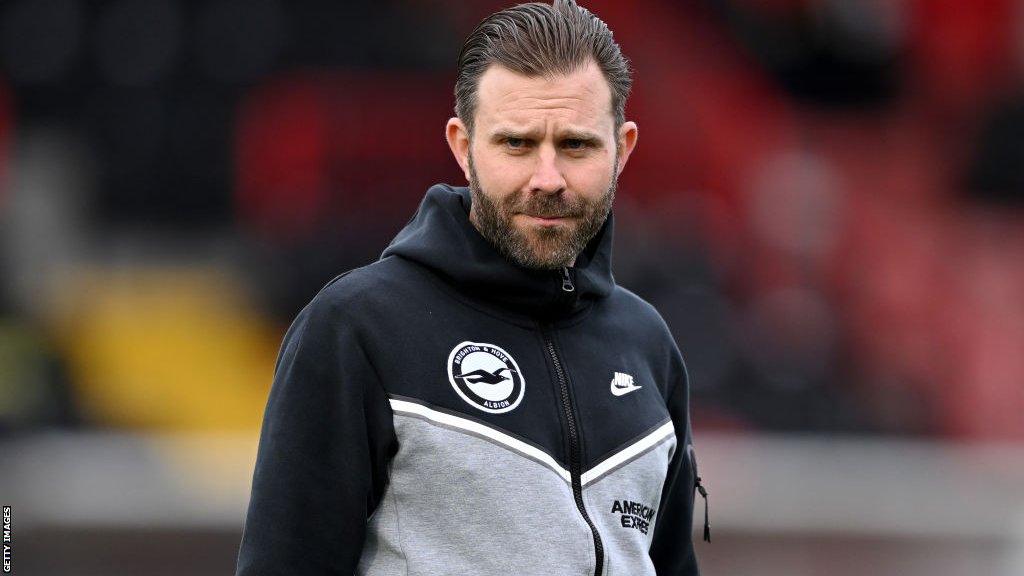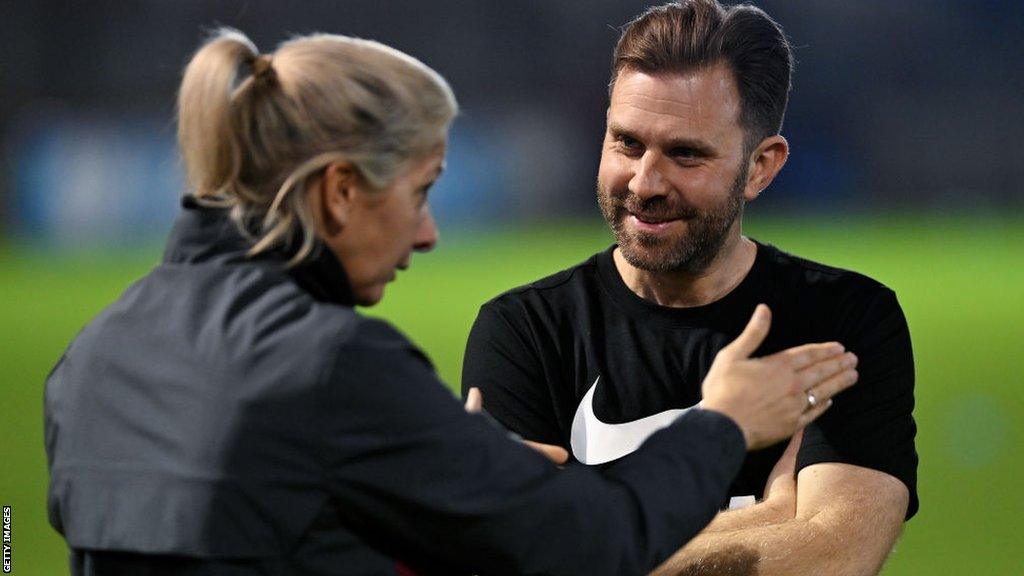Mikey Harris: Brighton boss on his journey into the WSL
- Published

Mikey Harris has coached senior men's teams and boys academies at Portsmouth, Southampton, Brighton and Salisbury City
Brighton interim boss Mikey Harris had never worked in the women's game before so it was understandable he felt like "a guest" during his first few days in charge.
But Harris, 39, has enjoyed a whirlwind two months working in the Women's Super League, which was typified by a thrilling 3-2 win over Leicester City on Sunday.
In a wide-ranging interview with BBC Sport, Harris discusses his football career, the challenges of the WSL and gives an insight into his personality.
'It is an honour to work in the WSL'
Having moved across from Brighton's boys' academy following the sacking of Melissa Phillips, Harris has helped the women's team move 11 points clear of relegation.
He has made a strong first impression, backing up the club's bold decision to sack highly-rated Phillips after nine months.
Whether he will remain in the role is yet to be seen but it is clear Harris does not see this as a stepping stone to climb up the coaching ladder in the men's game.
Former Lionesses boss Phil Neville was criticised, external when he said he had always planned to leave after three years after gaining "managerial experience" that he could use in club football.
"I would agree [that] it is an honour to work in the WSL," Harris told BBC Sport.
"For me to be entrusted in this role, for however long it lasts, is an amazing feeling and it is a privilege. There are 12 teams in the WSL, so 12 head coaches. To be one of them is a massive, massive honour.
"So from my perspective, there is no part of me that's ever thought 'this will be a great stepping stone for me to get into the men's senior management game'. I wouldn't see it like that at all."
'I feel like I can help people'

Mikey Harris (right) meets Aston Villa boss Carla Ward (left) before their first meeting in February, just a week after he took over the role as interim manager
Harris' love for coaching is clear. He has worked since the age of 15, setting up his own coaching business, before earning his qualifications and gaining valuable experiences at boyhood club Portsmouth, as well as Southampton and Brighton.
He became the youngest head coach in English football in 2013 when he took over Salisbury City at the age of 28 and later became part of England's coaching staff - though his stint was cut short due to Covid.
His father worked at Portsmouth and Harris spent time in the company of World Cup winner Alan Ball. Before he knew it, he had a "calling" to go into football coaching.
"I loved it. I loved coaching. I loved helping younger kids get better, making them smile and being around those groups of people," said Harris.
"As I'm getting a little bit older and hopefully a little bit wiser, I've picked up a handful of coaches that I mentor. I'm genuinely driven by helping people be the best versions of themselves and football is a great vehicle for that.
"I'm a people person and I've developed my listening skills over the years. As an extrovert that's not easy sometimes! I feel like I can help people."
'I've never felt like I don't belong'
Harris' enthusiasm and success saw him thrust into the Brighton Women's interim role - something he "did not plan for" but has fully embraced.
"There's loads of stuff I've learned. I'm learning more about the players, the league, the coaches you come up against and interacting more with the media," added Harris.
"When you've worked in the men's and boys game for 20 years and that's all you've ever known, to then come into this environment overnight, I think it would be normal to feel you don't belong here.
"I guess for the first few days I felt like a bit of a guest to the women's game. But now, as time has gone on and I reflect, I've never felt uncomfortable or that I don't belong."
One of the biggest challenges throughout Harris' career has been finding a balance between "challenging players and supporting them".
He hopes his values - which he explained to his players before his first WSL game against Manchester United - helps them understand his management approach.
"It's about how you have that conversation. I always say to every group of players when I work with them, I will never judge them as a human being but I have to judge them as a footballer," he said.
"If I leave them out, it's not that I respect them or care about them any less as a person, I just have to pick 11 players. I will always tell them why. They may not agree with me, but I will support them and always have their backs."